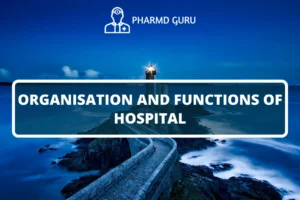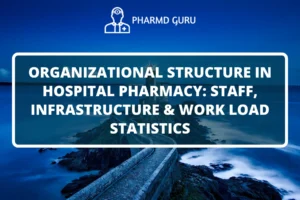Roles and responsibilities of hospital pharmacist is a topic in Hospital Pharmacy, which covers: Roles & responsibilities of Indoor pharmacist and Roles & responsibilities of outdoor pharmacist.
SCROLL DOWN TO THE BOTTOM OF THE PAGE FOR ACTUAL NOTES
Hospital pharmacists play a crucial role in the healthcare team, working closely with physicians, nurses, and other healthcare professionals to ensure the safe and effective use of medications. They are responsible for various essential tasks related to medication management and patient care within the hospital setting. Let’s explore the key roles and responsibilities of hospital pharmacists:
1. Medication Dispensing and Distribution
Hospital pharmacists are responsible for dispensing and distributing medications to patients. They review medication orders, ensure accuracy, and provide appropriate dosage instructions. Pharmacists collaborate with pharmacy technicians to prepare and dispense medications while maintaining strict quality control and adherence to regulatory guidelines.
2. Medication Therapy Management
Hospital pharmacists play a vital role in optimizing medication therapy for patients. They review patient medical records, assess medication regimens, and make recommendations to healthcare providers to enhance therapeutic outcomes, minimize drug interactions, and prevent medication-related problems. Pharmacists may also provide medication counseling to patients, explaining proper usage, potential side effects, and necessary precautions.
3. Clinical Pharmacy Services
Hospital pharmacists provide clinical pharmacy services, actively participating in patient care rounds and multidisciplinary team meetings. They offer expertise in medication selection, dosage adjustment, and monitoring to ensure safe and effective medication use. Pharmacists collaborate with healthcare providers to develop individualized treatment plans, optimize medication regimens, and manage complex medical conditions.
4. Drug Information and Education
Hospital pharmacists serve as a valuable resource for healthcare professionals and patients by providing accurate drug information. They stay updated with the latest research, guidelines, and drug developments, and share this knowledge with the healthcare team. Pharmacists educate patients and caregivers about medications, including potential side effects, interactions, and proper administration techniques.
5. Medication Safety and Quality Assurance
Hospital pharmacists play a crucial role in medication safety and quality assurance. They implement systems and protocols to prevent medication errors, such as double-checking medication orders, verifying dosages, and ensuring proper labeling and packaging. Pharmacists actively monitor and report adverse drug reactions and participate in medication error analysis and prevention initiatives.
6. Formulary Management and Drug Utilization Review
Pharmacists contribute to formulary management within the hospital, working closely with the Pharmacy and Therapeutics (P&T) committee. They evaluate new medications, assess their clinical and cost-effectiveness, and make recommendations for inclusion in the hospital formulary. Pharmacists also conduct drug utilization reviews to monitor prescribing patterns, identify opportunities for improvement, and promote rational and evidence-based medication use.
7. Pharmacy Operations and Management
Hospital pharmacists are involved in various aspects of pharmacy operations and management. They oversee inventory management, ensuring an adequate supply of medications while minimizing waste and controlling costs. Pharmacists collaborate with pharmacy technicians and support staff to maintain efficient workflows, implement quality assurance measures, and comply with regulatory standards.
8. Research and Quality Improvement
Hospital pharmacists contribute to research and quality improvement initiatives within the pharmacy department and the broader healthcare system. They participate in clinical research studies, medication-related outcomes research, and quality improvement projects aimed at enhancing patient safety, optimizing medication use, and improving healthcare outcomes.
9. Continuous Professional Development
Hospital pharmacists engage in continuous professional development to stay updated with advancements in pharmacy practice, regulatory changes, and emerging therapies. They attend conferences, workshops, and seminars to enhance their knowledge and skills, ensuring the delivery of high-quality pharmaceutical care.
ACTUAL NOTES




